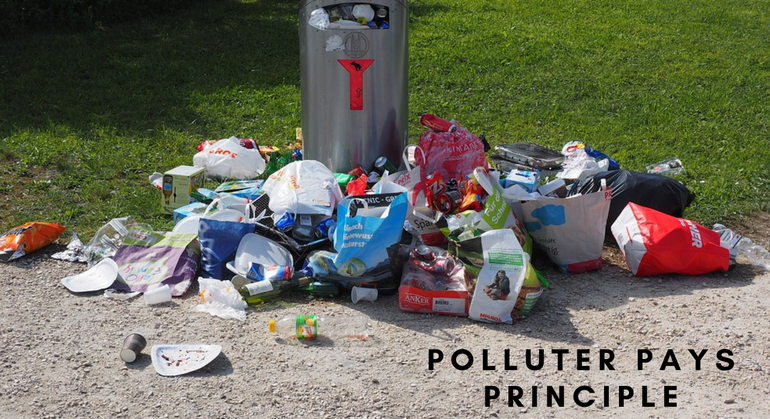

Polluter Pays Principle
Polluter Pays Principle has become a popular catchphrase in recent times. 'If you make a mess, it's your duty to clean it up'- this is the main basis of this slogan. It should be mentioned that in environmental law, the 'polluter pays principle' does not refer to "fault." Instead, it favors a curative approach which is concerned with repairing ecological damage. It's a principle in international environmental law where the polluting party pays for the damage done to the natural environment. It is regarded as a regional custom because of the strong support it has received in most Organization for Economic Co-operation and Development (OECD) and European Community (EC) countries. International environmental law itself mentions little about the principle.
In recent days, the polluter pays principle is seen as a way of internalizing pollution-related costs within the context of the economic rationality of the enterprise. There is a close relationship between a country's environmental policy and its overall socio-economic policy. Furthermore, under this principle, it is not the responsibility of the government to meet the costs involved in either prevention of environmental damage, or in carrying out remedial action, because the effect of this would be to shift the financial burden of the pollution incident to the taxpayer. But State practice does not support the view that all depollution costs should be borne by the polluter, particularly where a transnational dispute is involved.
The Concept
The Polluter Pays Principle imposes liability on a person who pollutes the environment to compensate for the damage caused and return the environment to its original state regardless of the intent.
The polluter pays principle is essentially based on a common-sense approach for the mitigation of environmental degradation. It simply means that s/he who damages the environment should bear the cost of rectifying that damage. In a broader sense, producers of goods and other items should be responsible for any pollution which the process of production causes and therefore must also pay for prevention or rectification of the damage caused to the environment by such pollution. Underlying the meaning of the polluter pays principle is the belief that when public authorities take measures to prevent potential and actual environmental damage, the expenses incurred should be borne by the person responsible for the pollution.
What Is The Polluter Pays Principle?
In the event of environmental pollution, the principle can be applied to require the producer and/or resource user to meet the costs of implementing an environmental standard. Where it is required, the resource user should also meet the necessary expenses for the implementation of technical regulations. It is also suggested that the introduction of liability regimes be introduced to make resource users liable for causing environmental harm and thus pay for the pollution caused by their authorities.
The Polluter pays principle originates from the economic theory of the “internalization of externalities”, which imposes on the polluters the social costs borne by public authorities responsible for inspecting, monitoring, and controlling pollution. By the same token, the PPP encapsulates the setting up of a system of charges by which the polluters (the persons who generated the pollution by their products or services) bear the financial burden of the public policy to protect the environment. However, despite its initial economic background, the PPP started gradually acquiring legal expressions.
Polluter Pays Principle In The Indian Context
In Indian environmental jurisprudence, the ‘polluter pays’ principle includes environmental costs as well as direct costs to people or property. The Supreme Court of India has fleshed out the ratio by stating that the ‘remediation of the damaged environment is a part of the process of the sustainable development and as such the polluter is liable to pay the cost to the individual sufferers as well as cost of reversing the damaged ecology.’
The Supreme Court of India inexplicitly applied the principle in the case of M.C. Mehta v. Union of India in the year 1986. It was declared by the court that ‘we have to evolve new principles and lay down new norms, which would adequately deal with the new problems which arise in a highly industrialized economy’. The significance of this judgment lies in the court’s formulation of the principle of the measure of liability of industry engaged in ‘hazardous or inherently dangerous activities’. Such measures must be correlated to the magnitude and capacity of the enterprise.
Secondly, the court directed the industry either to shift from the present location or evolve a green belt around it as a condition precedent to restart the industry. Further, the industry was asked to deposit a sum of Rs. 35,00,000/- in a bank and a guarantee of Rs. 15,00,000/- with the court for compensation to be paid to one who can prove before the court of law that he suffered because of the Oleum gas leakage from the Sri Ram Food and Fertiliser Corporation. Thus an innovative remedy was evolved by the Supreme Court of India in this case which was indirect recognition and application of the ‘polluter pays principle’.
Conclusion
With the rapid development of technology and industries, environmental degradation is inevitable, and dealing with it becomes vital for human existence. The problem escalates when economic aspects of dealing with it become dominant, and the polluters pay principle helps in dealing with the later. We have seen the situations, how it has been helpful both in an international and national context. What is needed is the strict implementation of the principle, which can change the situation to a very large extent.



